Hamlet: Difference between revisions
Jump to navigation
Jump to search

imported>Joshua David Williams (creation) |
imported>Joshua David Williams (working on the story description) |
||
| Line 4: | Line 4: | ||
| title=Hamlet; An analysis of the play by Shakespeare | | title=Hamlet; An analysis of the play by Shakespeare | ||
| date=Accessed April 19th, 2007 | | date=Accessed April 19th, 2007 | ||
}}</ref> This classic tale depicts the days of a young man named Hamlet in the months following his father's death. | }}</ref> This classic tale depicts the days of a young man named Hamlet in the months following his father's death. Finding it uncomely that his mother would wed his uncle so soon after this tragic event, Hamlet wrestles with the question of whether his father's death was the result of a natural snake bight, as had been told. | ||
It was in this time that the king's ghost appeared to the city guards. When Hamlet was made aware of this, he spent the night at the post, awaiting his father's soul. | |||
==Related topics== | ==Related topics== | ||
Revision as of 14:34, 19 April 2007

Hamlet and Horatio in the cemetery by Eugène Ferdinand Victor Delacroix; this painting depicts Hamlet holding the skull of Yorick, the king's jester.
Hamlet is a tragic play written by William Shakespeare and is believed to be have been first published in 1603.[1] This classic tale depicts the days of a young man named Hamlet in the months following his father's death. Finding it uncomely that his mother would wed his uncle so soon after this tragic event, Hamlet wrestles with the question of whether his father's death was the result of a natural snake bight, as had been told.
It was in this time that the king's ghost appeared to the city guards. When Hamlet was made aware of this, he spent the night at the post, awaiting his father's soul.
Related topics
External links
References
- ↑ Hamlet; An analysis of the play by Shakespeare (Accessed April 19th, 2007).